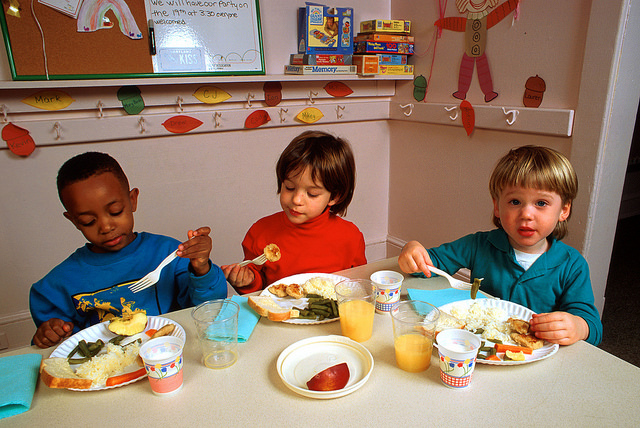
Positive Feeding Relationships – a Q&A with Prof Jackie Blissett
Mealtime Hostage Parenting Science Gang are hot on the trail of gaps in research looking at extreme fussy eaters – children who won’t just eat when they get hungry. Some of these children have been diagnosed with a condition known as Avoidant/Restrictive Food Intake Disorder (ARFID). This week we talked to Prof Jackie Blissett about her research.
Image: Andrii Nikolaienko
Jackie: Hello everyone! I am a Professor of Childhood Eating Behaviour in the Department of Psychology, School of Life and Health Sciences at Aston University – a researcher interested in children’s eating behaviour. I’ve been working in this field for 20 years.
I am particularly interested in how children’s individual differences (e.g. in temperament, sensory processing, impulsivity) relates to their eating behaviour, and how parents’ feeding practices might interact with those child characteristics to determine better/poorer eating.
I have 2 teenage daughters- one of whom was a very selective eater in her younger years – and I knew exactly what I was supposed to be doing in terms of feeding! I think it was this that made me particularly interested in how children’s characteristics might mean we need different interventions for different kinds of kids!
Q: Hi Jackie, thanks so much for joining us! We’ve become increasingly aware that challenging eating behaviour is linked to lots of different things in kids, just as you suggested, for example temperament, sensory processing, impulsivity.
Have any of these different characteristics been studied more than others in terms of eating?
Jackie: There is a solid and growing literature on sensory issues in children’s eating behaviour, and a reasonable amount of information on temperament. The impulsivity literature tends to focus on over-eating rather than selective or under eating. But there’s still lots we don’t know!
PSG B: Sensory issues are something that we encounter a lot in our children, but I guess they must cover a wide spectrum. How do researchers measure or group sensory issues?
Jackie: Well – this depends on the researcher and their interest and sample of course, but generally in research we use parent report measures to ask about children’s visual, tactile, taste/smell, and auditory sensitivity. We can then look at sensitivity/lack of sensitivity, and children’s reactions to those stimuli.
I also work on taste sensitivity specifically, and in those cases we can use specific taste tests. Clinicians also have different approaches (and this may vary depending on profession).
Q: Your research sounds fascinating! Do you think that children who are more sensitive in temperament are more prone to selective eating?
Jackie: Yes there is lots of evidence that children who show less of what psychologists call ‘approach’ behaviours (e.g. outgoing, sensation seeking) are more likely to be selective eaters. And also that children who have more difficulty with sensory processing (e.g. things in the world are too smelly, too bright, too itchy, too strong in taste) are more selective too.
Q: Jackie, apart from Division Of Responsibility methods, is there anything else we can do to help our children or is it just a case of giving these things time and eventually when they know the pressure is off they will widen their choices of food that is acceptable?
Jackie: Well that’s a BIG question!
The answer is: probably yes, depending on the severity of your child’s feeding problems.
PSG C: There always one ?
Jackie: Generally speaking, the literature suggests that repeated exposure (offering less preferred foods regularly, no pressure to consume), modelling (eating the foods yourself), and using stickers or other small rewards for tiny tastes (again, without pressure) can help some children to try then learn to gradually accept new foods.
I should also say there is promising literature on sensory exposure (playing with food, sniffing, food art, etc)
But importantly, most of the literature we have does not look at the extreme end of the spectrum of eating problems.
PSG B: Is anyone looking at the extreme end of the spectrum Jackie? I’m guessing that it’s funding and small patient numbers that are the major barriers to this?
Jackie: Yes exactly. ARFID (Avoidant/restrictive food intake disorder) is still pretty poorly researched, and funders have yet to be persuaded.
One of the things we (and others) have been doing recently is to start looking at these ‘individual differences’ when we are running intervention studies. For example, one study from the Netherlands looking at using modelling to improve children’s veg intake showed an overall positive effect of the intervention but 40% of the children consistently ate none of the target veg at all.
And we have shown that parent practices like modelling and promoting to eat have different effects depending on how food-responsive children are (i.e. how likely they are to eat just because there’s food around).
Clearly, it’s not really the food responsive kids that we need to intervene with.
PSG B: Wow – 40% never eating the target veg doesn’t sound very positive!
Jackie: True – and yet the effect is significant overall. This is a real problem in our literature to date – we don’t know enough about what to do with that 40%!
Q: I’m really concerned about all the “healthy eating” agendas targeting young children.
Is there any research looking at the efficacy of this? And importantly, the negative impact it can have on anxious/sensitive children?
Jackie: This is another interesting area. There’s no doubt we need to talk about food choices with kids generally – our obesity problems show this – but I don’t think there’s good evidence about what effects the ‘healthy/unhealthy good/bad’ division has on kids, and particularly not on those who are already concerned about eating.
PSG D: Interestingly I have encountered schools where they are taking the “healthy eating” talk to extreme – to children as young as 6/7. At that age these children can be black and white about eating/drinking, and unlike older children with eating disorders, any change is normally a sharp/quick decline.
Jackie: I agree that ‘black and white’ thinking isn’t ideal – as we all know there aren’t really good or bad foods, just we might need different amounts of some foods than others!
PSG D: Unfortunately body image/dysmorphia is showing up earlier and earlier. It’s a challenge.
PSG F: My understanding from literature on the effects of dieting and food restriction in adults is that generally having rules about good food, bad food etc, counting calories etc, generally lead to unsustained weight loss and then weight gain – with people often ending up with more body fat than they started out with.
Why are public health campaigns not seemingly aware of literature on appetite regulation and the factors supporting healthy development of this instead?
Jackie: I think this comes from the tension between prevention and intervention. Obviously, it is better to prevent problems – but that requires much up-front investment.
Interventions, particularly for obesity/healthy eating, are what we end up needing then, and on a large scale. These tend to be at a public health level and therefore are often very focussed on just providing information – the ‘what’ we should be doing (which most people know) and not ‘how’ to do it. Also, there’s not a great deal of psychology integrated into these campaigns.
PSG B: I definitely see that there is a lot of information provided to the public in general. But what I find interesting is that although parents are bombarded with advice on how to do pretty much everything, from the right way to change a nappy to how many blankets to use, there seems to be very little when it comes to weaning.
Do you think that if baby books/websites had more information about not force-feeding babies with “just another spoonful” of puree that there would be an impact on feeding issues later on?
PSG D: As a dietitian I spend a lot of time talking about responsive feeding and amounts but then parents see someone else who tells them something different. We need more health professional training to ensure consistent and appropriate advice. We also need increased early access to skilled professionals when parents need advice/help and reassurance.
Q: As a dietitian I’m bombarded with feeding issues on a daily basis. I’ve done a lot of the sensory courses etc. but struggle with behavioural advice. We don’t have psychological services except for anorexics… any books/training you would recommend?? Thanks!
Jackie: Yes it can be difficult to change behaviour in feeding problems – but not impossible! You may need a psychologist to have input in very challenging cases, though I know they are like hen’s teeth.
PSG D: Don’t remind me! Unfortunately dietitians are often the ones sent these problems labelled picky eater… any help appreciated. I’ll do the ARFID course in July and I’ll keep flagging the need for multi-disciplinary teams including psychology….
Jackie: Also, check out the Child Feeding Guide resources. They aren’t aimed at clinical populations per se but do run training courses for carers and health professionals and all their advice is evidence based and not industry funded.
There are also courses run by Birmingham Food Refusal Service (clinical psychologists with expertise in ARFID.
PSG D: I’m lucky – one fantastic consultant I work with gets it!! Some fab Speech-Language Therapists and Occupational Therapist also work with me, but we are fire walling!!
PSG D: What about tube weaning and dependency??
Jackie: Re: tube feeding – Sarah Mason & Gill Harris in link above both work extensively with tube weaning- generally gradual reduction in calories combined with desensitisation once it is safe to have foods/tastes/textures orally.
PSG D: Thanks! That’s where I’m sitting, but without child psychologists, it’s challenging.
Q: My husband is of the opinion that our 3.5 year old son’s selective eating is caused by a one off incident when he was about 13 months old. He ate a massive dinner one night and was later violently sick in his cot. Soon after he started to reduce his selection of foods rapidly and has never ‘recovered’, although his food preferences have changed.
Jackie: I can’t give specific advice but likely 2 things going on here: firstly, one off episodes of severe sickness can cause long term associations between whatever food was eaten before the sickness and the distress and illness it caused. Many of us even as adults will refuse foods that once made us ill.
But also, we often see the narrowing of diet/food preferences occurring in the second year of life. This increase in what we call ‘neophobia’ (fear of new foods) is a natural developmental process, but it affects some kids more than others. And can be associated with very picky eating too.
PSG E: Yes, I am off the opinion that it would have happened anyway. To me, it’s more closely associated with him learning to walk so the neophobia fits with this.
Q: How much influence do sibling’s eating habits have? I’m wondering how much influence my eldest child will have on my youngest (who has just turned 6 months).
Jackie: Well again one of the problems we have is that there isn’t much literature on this. But we do know that older children (think more like 5 years than 6 months) do pay attention to what their peers and siblings are eating and are more likely to try new foods if they see others eating. I wouldn’t be overly concerned though if your younger child has lots of other positive role models for eating.
PSG F: That’s interesting, especially when my older child has many positive role models for eating too.
Jackie: There are some children, I think, who are less likely to model what others are doing.
One study I ran a while ago showed that kids with high taste/smell sensitivity ate fewer fruits and veg, irrespective of what their parents ate. We find a positive pattern in children who aren’t so sensitive – when parents who eat more fruit and veg and the kids aren’t so sensory sensitive, the kids eat more fruit and veg – perhaps because they copy their parents or respond to the food environment/available fruit and veg at home.
I think some factors – such as sensory processing, or autistic traits, are likely to impact on children’s tendency to imitate other people.
Q: Thinking about the relationship between parent feeding practices and child eating behaviour, what are some things you have observed in your research that negatively and positively influence parent feeding behaviour?
Jackie: In most of our research, we see that parents who are (understandably) anxious about their children’s eating or weight are more likely to use pressuring feeding practices.
This is no surprise – parents feel like they need to do something, after all, and there isn’t always great advice out there. But we do know that pressure to eat almost always fails to help in the long term.
PSG C: Or makes it worse, as in our case anyway.
Jackie: In terms of positive influences, parents who are more ‘authoritative’ in their general parenting style (i.e. set high expectations, structure, etc but respond to children with warmth) also tend to show more healthy feeding practices (such as monitoring; keeping an eye on intake without pressure/restriction).
And yes, pressure can make the situation worse – even in kids without feeding problems. In experimental studies, pressure to eat a food has been shown to reduce consumption and preference of the pressured food.
PSG G: Can you be more specific about what you mean by “healthy feeding practices”? How is this measured? (Or how could it be measured?)
Jackie: I mean practices associated with better feeding outcomes (e.g. monitoring, modelling, having a positive food environment at home) – we have standardised questionnaires that we use to measure this, or we can look at some of the practices within observed mealtimes, depending on the study aims.
PSG B: It’s interesting that the message that pressure really never works, doesn’t seem to have reached many parents.
Most parents have some idea that pressuring teenagers over pretty much anything is not going to work, so it’s odd that heavy-handed encouragement to eat a specified amount/type of food is still widespread.
Jackie: I think this is because a) for some kids, it does work in the short term (I bet most people here have had a friend/neighbour/relative say ‘well my kids just eat what they are told and that’s that). If a child isn’t particularly fussy or sensitive pressure to eat, “three more bites!” might make them eat three more bites. The long-term impact on their preferences isn’t so noticeable at the time, of course.
And b) for parents with a very selective eater, they are really, really trying to do the right thing in the absence of good advice. Strategies such as repeated exposure take a long, long time, much patience, and that can be hard when you are anxious about their eating and weight.
Q: Do you have any thoughts on what might persuade funders that ARFID is worth funding research into?
Jackie: I wish I had the answer to that!
Q: Given unlimited resources, what research would you want to see taking place into ARFID?
Jackie: Firstly, I think it would be important to examine the factors in more depth that differentiate where the ‘cut off’ is between selective eating and ARFID. That would help us to focus interventions.
Secondly, we need to know whether the kinds of strategies that work on kids generally work on selective eaters and on kids with ARFID. For example, can we use the same kind of sensory exposure interventions, or do they need adaptation (slower, more frequent, etc?)
I also think we have much more to learn about how ARFID overlaps with other co-morbid issues and how this affects outcomes (e.g. autistic spectrum conditions).
Q: Jackie what do you think are the barriers for finding out more about this condition?
Jackie: Small samples, sometimes complex cases (other conditions which overlap). It is a ‘new’ diagnosis, so we are really starting from scratch.
PSG E: Jackie is there scope for including any of the PSG families in your research? Or is there an area where we could get involved / focus our research on?
Jackie: We would LOVE participation. Maybe we can design something together.
PSG E: I think there are a lot of families who would be interested in the PSG but also the Mealtime Hostage main group. I’d really love to hear your thoughts on this.
Q: We’ve not found a great number of researchers looking into ARFID. Who are the key player in your opinion?
Jackie: There really aren’t many. Those who have published so far are often clinicians (which is a good thing, of course, but means they are not spending all their focus on research).
In the UK: Rachel Bryant Waugh and her team at Great Ormond Street Hospital. Vicki Aldridge at De Montfort. My group have been looking at eating/feeding issues in autism/autistic spectrum conditions . There are also some Canadian researchers for example Mark Norris and Debra Katzmann.
Has this sparked your interest? Why not check out our other Q&As on the topic of fussy eating:
- Researching Avoidant/Restrictive Food Intake Disorder (ARFID) with Dr Terry Dovey
- Extreme Picky Eating with Jenny McGlothlin
- Fussy Eating with Dr Claire Farrow.
You can read all our Q&A sessions, on loads of different parenting-related subjects on the website.
And if you are keen to get involved, let us know. You can reach us at parentingsciencegang@gmail.com


